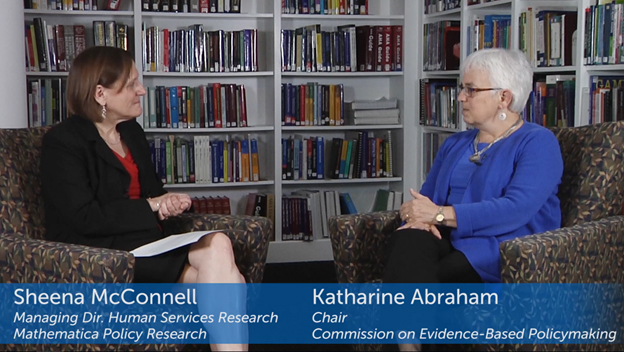When the Commission for Evidence-Based Policymaking released its final report last month, it provided a needed reminder that evidence can and should transcend partisanship in Washington. It also served as an important opportunity for the evidence community to remember its common goal to inform policies and programs with objective evidence.
As Paul Decker wrote, the report was “a crucial step forward in charting a course, but what comes next will determine whether we can deliver on the true promise of evidence-based policymaking.”
To better understand what went into the report and explore the very important question of what comes next, we invited Katharine Abraham to visit Mathematica’s DC office for a conversation with our own Sheena McConnell. Abraham, who cochaired the Commission for Evidence-Based Policymaking, was kind enough to take us up on the offer.
One area of the report that led to a lot of questions from the evidence community and beyond was the recommendation to create a stand-alone National Secure Data Service. It wasn’t the clearinghouse or repository model that many were expecting, but as Abraham noted in the conversation, it was the commission’s way of balancing the inherent tension between providing better access to data and protecting privacy.
Abraham also made it clear that there is significant work ahead for people within government and its partners in creating evidence.
Although the opportunity for bipartisan legislation was a key takeaway for many people during the rollout of the report, Abraham was also quick to manage expectations and highlight other steps that can be taken quickly to implement the recommendations and begin making important progress.
In fact, the drum beat of progress since the report was released in early September has continued. The House Committee on Government Oversight and Reform held a hearing on September 26th to discuss the report and its recommendations. And although the commission expired at the end of September, the Bipartisan Policy Center recently announced the creation of a new Evidence-Based Policymaking Initiative, which will continue to advocate for the implementation of all 22 recommendations from the report.
The full video of their conversation is available here:



